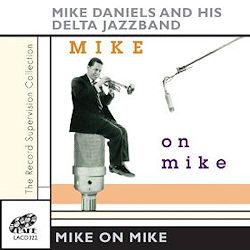Hiawatha Rag
Don’t You Think I Love You?
Steamboat Stomp
Wildcat Blues
Jelly Bean Blues
Thick Lip Stomp
Soleil Perdu
King Porter Stomp
Cushion Foot Stomp
Careless Love
Struggle Buggy
Moan, You Moaners
The Pearls
Deep Duke
Lovin’ Gal Lucille
Belmont Strut
House of David Blues
Don’t You Think I Love You?
Savoy Blues
Gatemouth
Mike Daniels and his Delta Jazzband
Recorded 1948-60
Trumpeter Mike Daniels led a popular band whose reputation has dimmed somewhat over the years, so it’s good to be reminded of its many virtues in this
selection of discs made between 1948 and 1960. In its ranks were men like John Barnes, who stayed for six years, and (in an earlier incarnation) Freddy
Legon, whom some will recall from Humph’s band. Mickey Ashman was the bassist in 1949, and the following year Daniels attracted Cy Laurie and trombonist
Charlie Galbraith. So there were some strong personalities on board during the years in question.
The repertoire was Classic. The band espoused Rags, Morton, Oliver, Waller and an old Ma Rainey song too, Jelly Bean Blues which is delivered by
Doreen Beatty, who seems as much in thrall to Ottilie Patterson as to the original. I was impressed by the mobility of trombonist Gordon Blundy in his
ensemble work - notably on Wildcat Blues - where Barnes takes a well judged solo, and by the Ellingtonian voicings penned by co-composers Barnes
and Daniels on their original Soleil Perdu. More evidence of this affinity comes via Daniels’ Bubber Miley evocations on Deep Duke. Above all the style is right; not simple recreations, or aspic preservations, their Morton songs, in particular, are respectful but not blasé.
One might have thought that the use of Don Smith’s sousaphone in some of the 1960 sessions might have mired the band in aural treacle – as so often
happened to bands that preferred its use to the string bass – but fortunately Smith is an athletic purveyor of brass.
The ‘bonus’ tracks, of which there are six, take us back to those early sides. The rhythm is inevitably much heavier and less flowing, especially when Owen
Maddock’s tuba is added to the mix alongside Roy Hardy’s somewhat dogmatic drumming. Dave Webb was a perfectly serviceable clarinettist and Daniels even
then spirited. But there’s too much of a Lu Watters feel about things, which changed in 1949 when Ashman took the bass seat. The transitional band in 1950
shows a move toward greater individuality, especially with Laurie added, but it’s still not the last word in subtlety.
This is an excellent introduction to the Daniels band, and well transferred, charting a course from the rough to the smooth in sessions over a thirteen
year period.
Jonathan Woolf
